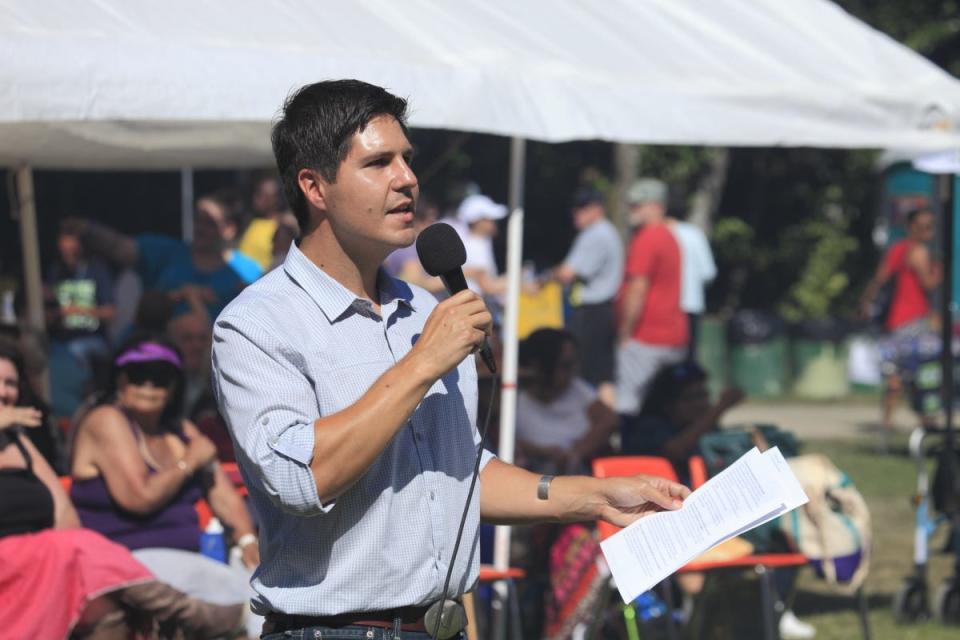Native American tribe's eviction plan raises civil rights concerns. Should US government intervene?
A Washington state tribe's plan to evict disenrolled members from federally assisted tribal housing pits two lauded values against each other: U.S. government responsibility for protecting civil rights and Native American tribal sovereignty.
Two U.S. government agencies have urged the Nooksack Indian Tribe to delay eviction plans, which could affect 63 people in 21 tribal homes, while the Department of the Interior's Bureau of Indian Affairs investigates "extremely concerning allegations of potential Civil Rights Act and Indian Civil Rights Act violations regarding these evictions," according to a letter sent to the tribe in late December.
In another letter, the Department of Housing and Urban Development, which provides financial assistance for the tribal homes and had been asking Nooksack leadership to delay evictions since September, wrote that it was "troubled" by some of the pending evictions and said there could be consequences if they proceeded before the investigation concluded.
The Nooksack evictions target people who have been disenrolled – that is, removed from tribal membership – in recent years after tribal leadership concluded they weren't valid members. The tenants dispute their disenrollment and the planned evictions, with some saying they are entitled to full or partial ownership of their homes based on lease-to-own agreements, adding another layer of complexity. Tenants in 10 homes have been served notice.

A snowstorm postponed the first eviction on Dec. 28, Nooksack Tribal Chairman Ross Cline Sr. said. He said he then told the Bureau of Indian Affairs, which had asked for at least a 30-day delay for its investigation, that the tribe would hold off on evictions through January. He is proceeding under the expectation the investigation will be completed by Feb. 1, with the eviction process then resuming.
"Basically, we agreed to it provided (they) will agree to not hound us about it after they've completed their investigation," he said.
The U.S. government's involvement makes the Nooksack matter stand out, legal experts said.
"It's very rare for this to happen," said Matthew L.M. Fletcher, a Michigan State University law professor and director of its Indigenous Law & Policy Center. "At least in the last half-century, the U.S. has stayed away from internal tribal politics."
The prospect of eviction is daunting, especially considering the separation from longtime friends and neighbors and the high cost of housing in northwestern Washington, said Michelle Roberts, 57, a disenrolled Nooksack member and Deming, Washington, resident who has received an eviction notice.
"It's very stressful for us, just knowing we'll have to find someplace else to live and (being) all separated out," said Roberts, who, like many other disenrolled members, already has lost educational aid and financial stipends provided by the tribe.

Roberts, a longtime Nooksack member who once served on the tribal council, said the expulsions grew out of "a dispute within the tribe of different families" and was led by some who were "just really power hungry."
The situation is especially challenging for older tenants, including her 79-year-old father, Roberts said.
"It really is hard on them mentally right now," she said. "The elders have a hard time when I go and visit with them. There's 'What are we going to do? What are we going to do?' … It's really hard seeing them get emotional. Healthwise, some of them have heart problems, stress and depression, so it just antagonizes that more."
The eviction controversy is the latest eruption in a decade-long dispute over the disenrollment of more than 300 people from the roughly 2,000-member Nooksack tribe. Cline said the disenrolled members, descendants of a woman named Annie George, did not meet membership requirements in the tribal constitution or a 1942 census and were enrolled "fraudulently." He said the tribe is seeking evictions because Nooksack housing is only available to members.
The disenrolled members, who call themselves the Nooksack 306, have been battling the expulsion for years. Roberts said she and other disenrolled members can't get a fair hearing on disenrollment in Nooksack tribal court, where such matters are to be adjudicated, because the tribe barred their attorney, Gabriel Galanda, and other lawyers of their choosing from practicing there.
Galanda asked HUD and the Department of the Interior to intervene in the eviction process, saying his clients weren't getting due process and that their civil rights are being violated. In December, he petitioned the United Nations High Commissioner on Human Rights to appeal to the Biden administration to stop the evictions.

The U.S. government is focused on the evictions, and not disenrollment, a hot-button issue that is considered an internal tribal decision. Disenrollment has become a significant issue in recent years, with many tribes assessing lineage and rescinding membership to those with insufficient ancestral connection. In some cases, huge gaming income from big casinos has raised the financial stakes of membership.
The Bureau of Indian Affairs recognized the separate governing authorities in a statement to USA TODAY: "The federal government must protect the rights of individuals under federal law, including the Indian Civil Rights Act… BIA respects tribal sovereignty and supports tribal self-determination. Accordingly, we seek to work closely with our tribal partners to safeguard the rights of both tribes and individuals.”
Cline said the federal government should stay out of all tribal governance matters, including evictions.
"That's putting it politely," he said. "You could throw in some cuss words along with that."
Roberts acknowledged the importance of tribal sovereignty but said outside recourse is needed when civil rights are violated.
"It's a double-edged sword for us. We fought for sovereignty and it was given to us but when tribal councils use it as a tool to bully us, use it for the wrong reasons of disenrolling people or taking their homes away, then they need to be held accountable. The only source we have would be to go to the federal government or the U.N.," she said. "It hurts, but it's a necessary thing that we have to do in order to be treated fairly. We're not being treated fairly right now."
Nooksack government will be evicting us from our low-income housing on February 1st. Please donate if you can and retweet! https://t.co/hPfWk8YzDb
— Nooksack 306 (@nooksack306) January 20, 2022
Courts and Congress generally steer clear of tribal governance matters, often citing a 1978 Supreme Court case, Santa Clara Pueblo v. Martinez, that gives tribes immunity from lawsuits in federal court. Galanda, a Seattle lawyer and member of the Round Valley Indian Tribes of California, said earlier Supreme Court decisions call for federal intervention under a "moral trust responsibility."
"The tension lies between tribal self-determination and Indigenous human rights protection in the form of federal diplomatic intercession," he said. "I think there have to be scenarios in which the Indigenous human rights violation is so atrocious and so threatening to an Indigenous community's existence that the (U.S. government) must exercise its moral trust responsibility."
Galanda said the federal government has sought to influence other tribes on governance matters. He cited Department of Housing and Urban Development Secretary Marcia Fudge's October statement encouraging four Oklahoma tribes to accept descendants of Freedmen who once had been enslaved by the tribes after another Oklahoma tribe, the Cherokee Nation, amended its constitution to recognize the descendants as eligible citizens of the tribe. Other legal experts say that differs from the Nooksack situation, since the tribes' responsibility to enroll the descendants stems from previous treaty agreements. No such obligation binds the Nooksack tribe.
Legal experts diverge over whether the U.S. government is entitled to intervene in tribal governance matters.
Kevin Washburn, dean of the University of Iowa College of Law and a citizen of the Chickasaw Nation of Oklahoma, said tribal sovereignty must be respected, even in cases where people's rights are being violated.
"Tribal government, just like state governments and the federal government, sometimes violate people’s rights. … But the United States wouldn’t agree to be sued in tribal courts if a tribe disagreed with the way the United States was treating its citizens," he said. "Likewise, I don’t think tribes should necessarily be subject to federal courts when the federal government doesn’t agree with the way the tribe is handling things.”

Washburn, who refers to himself as "a tribal sovereignty absolutist," noted that the U.S. "has a checkered past in dealing with tribal nations" and doesn't necessarily act from a "morally superior" position.
On the other hand, Robert A. Williams Jr., a faculty co-chair of the University of Arizona Indigenous Peoples Law and Policy Program, said the Santa Clara decision and interpretations by lawyers and bureaucrats have led some tribes to believe "they can do whatever they want without any accountability to anybody else."
"There's no such thing as a constitutional right to tribal self-determination," said Williams, who is also a University of Arizona law professor and a member of the Lumbee Tribe of North Carolina.
In addition, Congress could abrogate tribal sovereign immunity, said Stephen Pevar, a member of the ACLU's national legal staff who was the principal author of a brief in the Santa Clara case that pushed unsuccessfully for individuals to be able to sue tribes in federal court.
For now, the disenrolled Nooksack Tribe members have been left to deal with the possibility of being forced from their longtime homes, a fear punctuated each time tribal police arrive, sometimes at night, to serve notice, tenant Michelle Roberts said.
"We use the side door (as) our main entrance and everybody who knows us knows to go to that door," which is outfitted with a ramp for her husband, Rupert Roberts, who uses a wheelchair, she said. "So, if anybody rings the front doorbell, we know it's somebody we don't know. My husband and I and my son kind of look at each other like, 'OK, what is it this time?' It's always a start when you hear the doorbell ring or the loud knocking, pounding on the door."
The process is wearing, she added. "I just don't want to answer the door anymore."
This article originally appeared on USA TODAY: Tribal eviction plan pits Native American authority vs. civil rights

